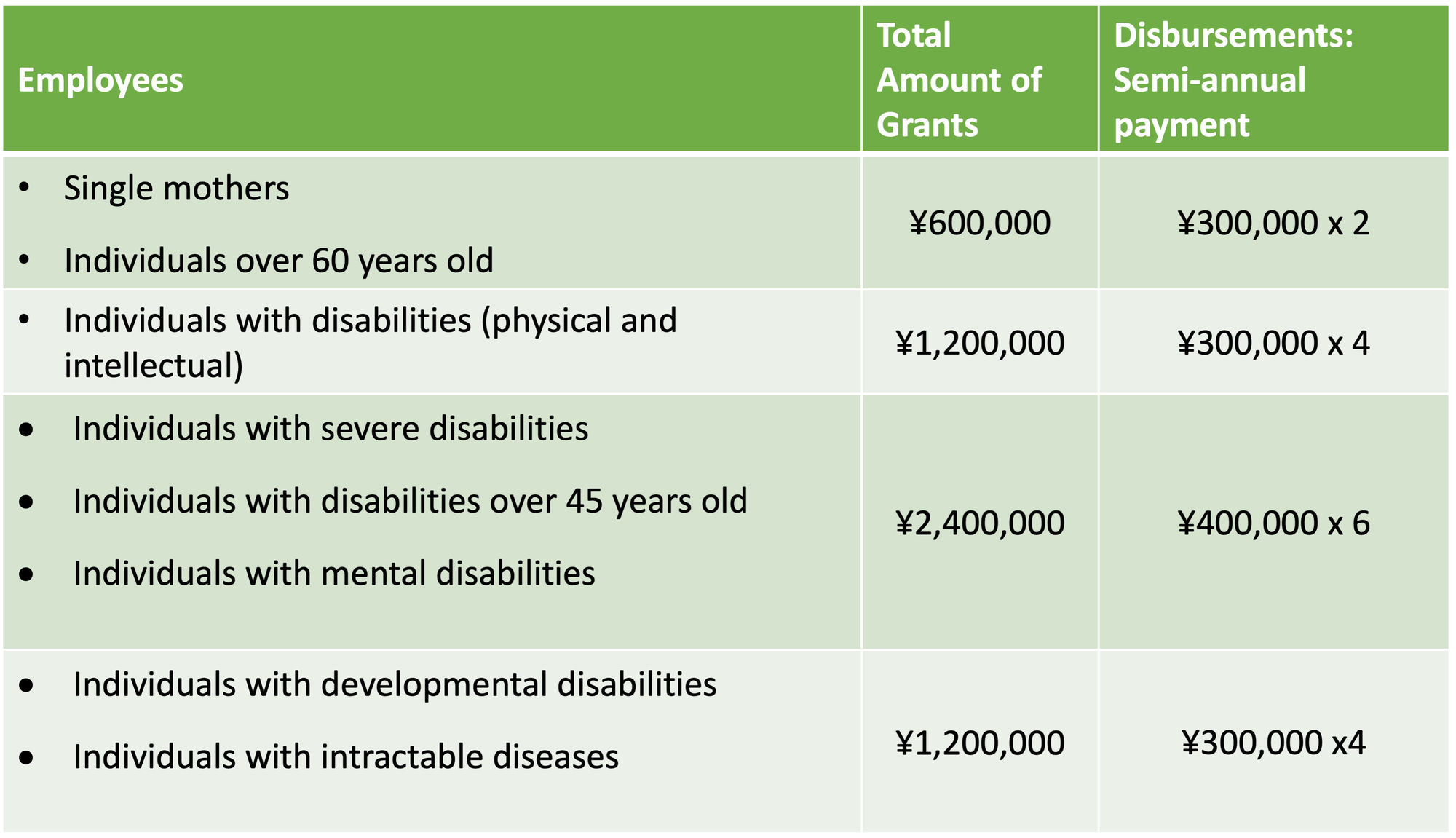HR-Focused MHLW Grants 1/3: For hiring single mothers, individuals with disabilities, and displaced Ukrainians
While Small Business Japan has typically focused on subsidies from the Ministry of Economy, Trade and Industry (METI), this article introduces those provided by the Ministry of Health, Labour and Welfare (MHLW), which promote the improvement of the working environment and conditions at companies.

MHLW's initiatives on enhancing HR & improving work environments
The differing jurisdictions of these ministries reflect their distinct focuses: the METI primarily promotes industrial growth, whereas the MHLW aims to improve the labour and employment environment through grants for HR-related expenses, which are called 'joseikin' (助成金) in general.
In Japan, the terms 'hojokin' (補助金) and 'joseikin' (助成金) both translate to 'subsidy' in English, particularly in the context of the government programme. For clarity, in Small Business Japan, we will use 'subsidy' when referring to hojokin (typically from the METI) and 'grant' when referring to joseikin (typically from the MHLW).
While subsidy applications are often associated with complex paperwork, the grants introduced here (unlike those from METI) have relatively straightforward procedures. The MHLW encourages companies to improve their working environments and employee conditions.
The most essential requirement for these grants is that your company must be covered by employment insurance.
MHLW offers various grants to support businesses and employees. This series examines three key MHLW grant initiatives. This article focuses on the first.
- Grant for Promoting Employment of Specified Job Seekers (特定求職者雇用開発助成金): Supports hiring single mothers, people over 60, people with disabilities, and evacuees from Ukraine.
- Grant for Career Development (キャリアアップ助成金): Supports companies that convert contract or fixed-term employees to permanent positions.
- Grant for Promoting Workplace Reform (働き方改革推進助成金): Financial support for a variety of productivity-enhancing initiatives.
We sought the expertise of Mr Tomohiko Narai, a certified social insurance labour consultant, or sharoshi, to understand the procedures and key points.
You can also contact Mr Narai for further assistance via his corporate website.
This article is for informational purposes only and does not constitute an advertisement for Narai's services.
(1) Grant for promoting employment of 'specified job seekers'
For companies hiring single mothers, individuals over 60 y.o., individuals with disabilities, and Ukrainians displaced to Japan*
Grant disbursement:
The grant is paid to companies in two disbursements:
- Six months after the employee's start date
- One year after the employee's start date
This grant is paid directly to the employer, not the employee.

Time-sensitive: Hello Work application required before hiring
Applying for this grant requires careful attention to detail. Here's some expert advice from Tomohiko Narai, an experienced sharoshi, to guide you through the process.
Q: What's essential when applying for this grant?
Tomohiko Narai: The job offer must be made through Hello Work.
Q: Many companies don't typically recruit through Hello Work. Does that disqualify them?
TN: Not necessarily. If you haven't signed an employment contract, there's still a way to meet this requirement. Even if you've already identified a candidate who meets the criteria, you can submit a job offer through Hello Work.
So, to be eligible for this grant, you need to follow a few steps.
- Submit a job offer to Hello Work.
- Refer the candidate to Hello Work: The candidate (even if already identified) must visit Hello Work and express interest in the position.
- Hello Work confirmation: Hello Work will contact the company to confirm the candidate's application and eligibility (e.g., confirming single mother status). The candidate will then attend an 'interview' with a referral letter from Hello Work.
- Interview and confirmation: Conduct the 'interview'. If the candidate is successful, inform Hello Work of the hiring decision.
It's important to follow these steps in this order. Otherwise, you won't be able to get the grant.
Q: So, to be clear, even if you've practically decided on a candidate, you should still advertise the vacancy through Hello Work?
TN: Yes, follow the procedure outlined above. When Hello Work contacts you, simply explain that you haven't decided yet. The candidate will then come to you with a referral letter from Hello Work, and you can conduct a formal 'interview'.
However, if you've already identified a strong candidate, you might not want to attract many applications. In that case, you can tailor the job description to match that candidate's specific skills and experience.
Q: This seems a bit unusual. Is it definitely legitimate?
TN: Yes, it is. As mentioned earlier, Hello Work determines that someone is employed when they become eligible for employment insurance. There's no issue if the recruitment is processed before that point. A qualified social insurance and labour consultant, or sharoshi, a state-licensed professional, handles these grant applications.
However, the procedure may seem relatively flexible compared to subsidies from the METI. These grants aim to promote the hiring of individuals facing barriers to employment, such as single mothers and people with disabilities.
Therefore, while the process may appear unusual, it's perfectly legal. The government actively encourages the employment of these individuals through grants.
It's crucial to follow the steps outlined earlier. If you report to Hello Work after the employee is enrolled in employment insurance, you won't be eligible for the grant, regardless of whether you meet the other criteria.

Proactively hiring single moms and individuals with disabilities (and securing grants)
Q: It's difficult for job applicants to disclose, for example, that they're a single mother. Many companies in Japan still treat single mothers unfavourably. That's why this grant exists.
TN: Yes, exactly. Often, you only find out someone is a single mother during the social insurance process after they've been hired. There's also a fear that the job offer might be rescinded if the employer finds out.
Similarly, some people with disability certificates don't disclose their disability if it's not immediately apparent. They fear that, if it becomes known, they'll be hired under the 'disabled quota' and paid less than non-disabled employees.
Q: These concerns are understandable.
TN: Yes. If your company is committed to diverse recruitment and intends to apply for grants, it's a good idea to state this clearly in your job adverts. You should also explicitly state that applicants won't be treated unfavourably if they are single mothers or have a disability.
Then, if you decide to hire someone, you could mention that the company will receive a government grant for diverse recruitment and reassure them that they shouldn't hesitate to disclose their circumstances.
It's also crucial to understand that withdrawing a job offer after it's been made, simply because the applicant is a single mother or has a disability, is unacceptable and is considered an abuse of the right to dismiss. Companies must avoid such discriminatory practices.
Q: This is quite a sensitive matter.
TN: Yes. It isn't easy to give definitive advice, but if a company wants to receive the grant, it must go through Hello Work before officially employing someone.
This process naturally lengthens the hiring process. However, if the grant application delays a recruit's start date, it could damage the trust between the company and the new employee. This is something to consider before proceeding.
Next up: The Grant for Career Development







